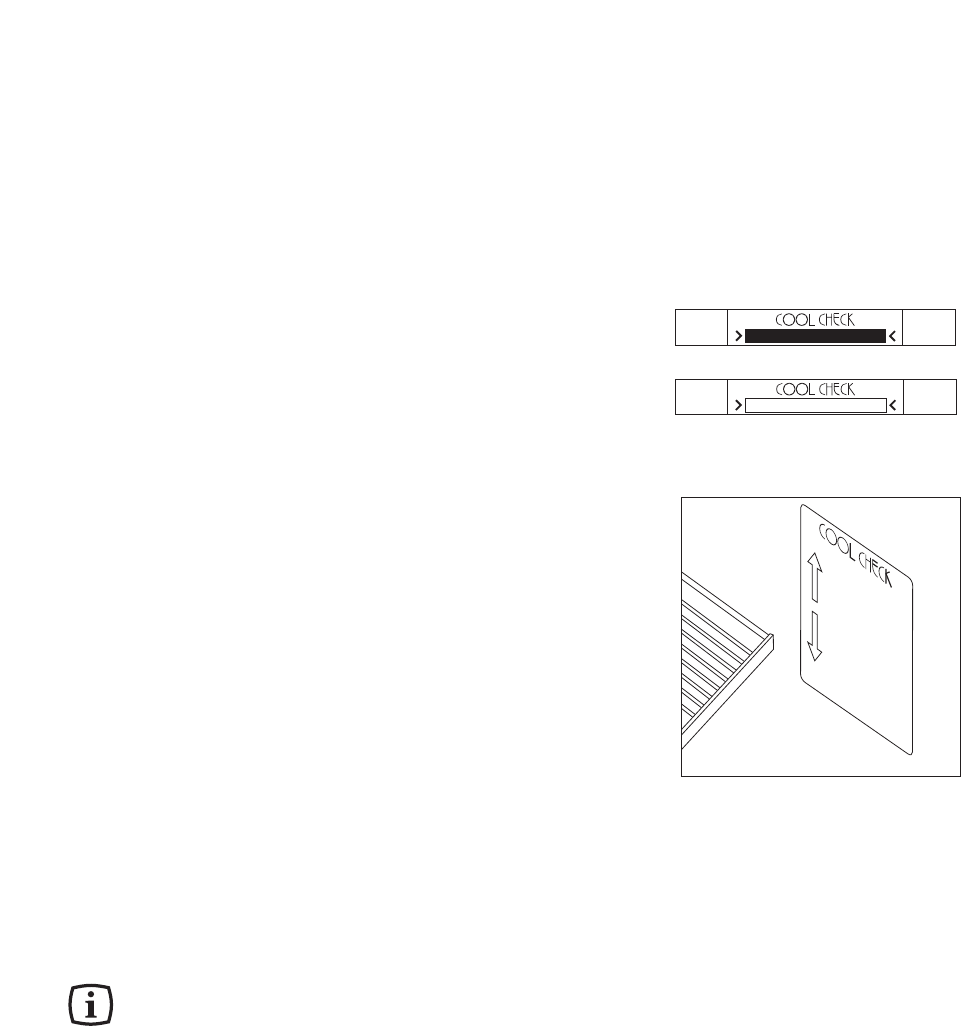
7
Cool Check Guide
The guide consists of a temperature sensitive strip
sealed in a shelf trim.
When the fridge is operating at the safe temperature
to store food the guide will appear black. If the
temperature rises above this level the guide will
show the words TOO WARM.
Positioning of the Cool Check
The shelf with the cool check temperature guide
must be placed in the fridge according to the
instructions located on the fridge wall and always
ensure the guide is at the front.
If the Cool Check shows TOO WARM
In certain conditions the temperature guide may
show TOO WARM if:
¥ The fridge is switched off
¥ The door has been recently opened
¥ A quantity of warmer food has been introduced to
the fridge
¥ The fridge temperature is above the
recommended maximum for the safe storage of
food.
The cool check will change to show ÒTOO WARMÒ
very quickly after the door has been opened. It will
however take a number of hours to return to black,
indicating that the temperature is correct.
The appliance should be left overnight and the cool
check examined in the morning. If the cool check
shows TOO WARM, turn the thermostat to a colder
setting leave overnight and examine again the
following morning.
Hints and Tips
¥ The guide is only suitable for use in the model
supplied.
¥ The guide will not operate in a freezer
compartment.
¥ When cleaning the shelf take care not to immerse
in water, and wipe away any spills.
TOO WARM
CCOO2
ZANUSSI
18
INSTALLATION
Positioning
This appliance is designed to operate in ambient
temperatures between 10¡C (50¡F) and 32¡C (90¡F).
It should be located in a dry atmosphere, out of
direct sunlight and away from extreme temperature
e.g. not next to a boiler or radiator, or in a very cold
room e.g. an outhouse, where the temperatures may
fall below 10¡C (50¡F). If these temperatures are
exceeded i.e. colder or warmer, then the appliance
may not operate correctly.
You should also ensure that air can circulate freely
around the back and the top of the cabinet. There
must also be at least 100 mm (4Ó) distance between
the top of the cabinet and any overhanging kitchen
furniture (A). Ideally, the appliance should not be
positioned beneath overhanging furniture (B).
There should also be a gap of 25 mm either side of
the appliance. Do not obstruct the space
underneath.
Rear spacers
The plastic bag containing all relevant
documentation also contains two spacers to be fitted
into special holes in the back of the appliance.
Fit the spacers into the holes, taking care to ensure
that the arrow (A) is positioned as shown in the
diagram. Then turn them through 45¡ (arrow (A)
vertical) until they lock into place.
DO NOT install in places with restricted ventilation.
Adjust the level of the appliance by screwing out the
adjustable foot, or feet, at the bottom of the cabinet
using your fingers.
D200
NP002
100 mm10 mm
10 mm
A
B
Warning
IF YOU ARE DISCARDING AN OLD APPLIANCE
THAT HAS A LOCK OR CATCH ON THE DOOR,
YOU MUST ENSURE THAT IT IS MADE
UNUSABLE TO PREVENT YOUNG CHILDREN
BEING TRAPPED INSIDE.
Depending upon the position which you choose for
your appliance, you may wish to reverse the way in
which the door opens. To do this, refer to instructions
on ÒDoor reversal directionsÓ paragraph.
PR60
A
45°
Important
It must be possible to disconnect the appliance from
the mains power supply; the plug must therefore be
easily accessible after installation.


















